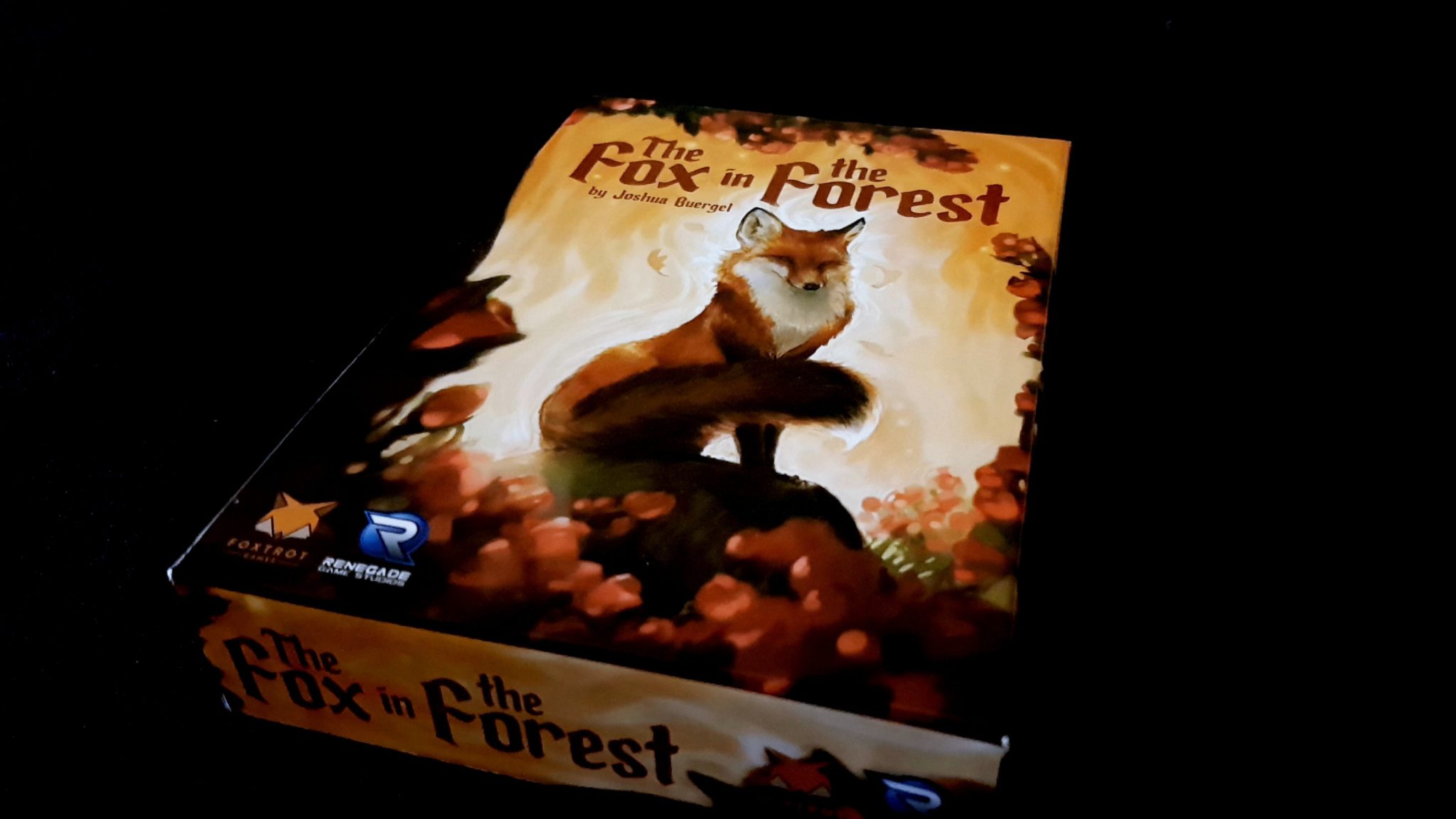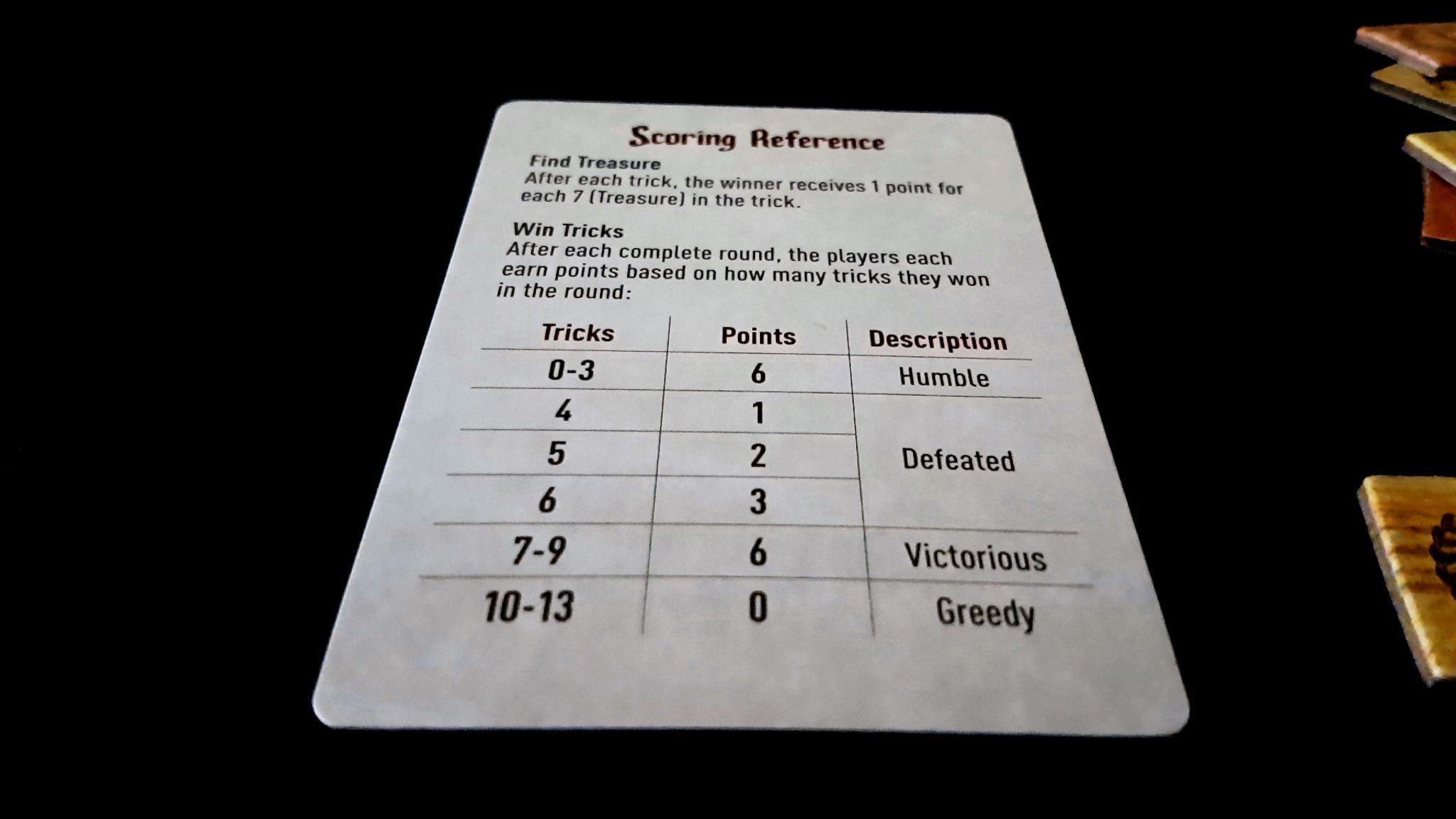| Game Details | |
|---|---|
| Name | The Fox in the Forest (2017) |
| Accessibility Report | Meeple Like Us |
| Complexity | Medium Light [1.58] |
| BGG Rank | 584 [7.10] |
| Player Count | 2 |
| Designer(s) | Joshua Buergel |
| Buy it! | Amazon Link |
I have many secret shames. Dark, terrible shames that nobody must ever know. Like the one where… wait, no. I can’t ever tell that story unless I want to spend the rest of my life dead in a Balinese jail cell. Hang on – if you’re a cop you have to tell me, you know. Right?
One of my more relevant secret shames is that I have no idea what a trick-taking game is and I have had this concept explained to me a good ten or so times by extremely earnest and helpful people. Every single time it’s like attending a lecture given by Charlie Brown’s teacher. Occasionally I say ‘Ah, now I get it’ just to make it stop. And every time I admit to this in public, without exception, someone will rise to the implied challenge and eventually retreat defeated. I suspect whatever parts of my brain that are needed to retain the idea just can’t hold it. It’s like my head is a hard-drive with malfunctioning sectors. I can occasionally briefly get a faint sense of comprehension but it’s like a half remembered dream. As soon as I stop fixating it’s gone and I’m left saying ‘So, I was playing Hearts with Stalin on top of a mountain, when Superted flew in…’.
It’s really weird and it also means I’m not a great person to review the Fox in the Forest. I’m told it’s a trick taking game but-honestly – how would I know?

The truth is that Mrs Meeple enjoys this game considerably more than I do – she took great pleasure in repeatedly crushing me until it became obvious at one point I hadn’t understood a thing that was going on. All this ‘leading suits’ and ‘trump cards’ nonsense is how I imagine it feels to be a computer neophyte being instructed how to use Skype by an impatient and tech-savvy niece. ‘GOD, just plug the filaments into the clobbergeist and fitzwoodle the flibbity-jibbs, WHAT’S SO DIFFICULT ABOUT THAT??’
STOP SHOUTING KAREN, I’M TOO OLD TO LEARN NEW THINGS. NOW, WHAT EXACTLY IS A SKYPE?

Anyway, this is how the game works. I think.
You and your opponent, for this is a game for two players only, each take possession of a hand of thirteen beautifully drawn cards. The rest of the cards in the deck are laid out to the side and the top one of these is dealt out face up. This is, as best I understand, the decree card which gives you the trump suit. That suit trumps things. What things? I’m less sure about that.
The player who won the last ‘trick’ (maybe?) plays out a card, and it’s beholden on the other player to ‘follow suit’ (perhaps?) with a card of the leading suit if they can. If they can’t, they can play anything but it will lose to the ‘lead suit’ (I assume?) unless it’s of the ‘trump suit’ (possibly?). The winner collects up the ‘trick’ (I’m pretty sure that’s right) and adds it to a growing pile of tricks they have collected. The game is over when the last trick is claimed. Simple. I’m told. Easy. People insist.

Was any of that right? Tell me in the comments! I mean, I’m not not going to read them because it’s going to look to me like a cryptic crossword puzzle put through a code obfuscator. You might help other people though.
Anyway, assuming you can get that all lined up properly you’ll see a functional game in here that will fail utterly to inspire or excite. There’s a bit more to it though, because some cards have special powers and they can change the way things unfold. In these cases, the trick becomes something more like three card monte as you send someone’s eye where you want it to go just so you can sweep up the prize when their attention is divided. They’re not tricks at that point. They’re illusions.
That’s nice and it lends an interesting sophistication to card selection – you don’t necessarily want to play the ideal card to beat your opponent because you may be waiting for a better opportunity to deploy it later. One of the cards for example lets you exchange the decree card with one that’s more useful to you. That means even a losing play can become a winner even though you were seemingly put in an untenable position. This uncertainty means you always have to be a little tentative when you play here – you won’t always get the result you expect even if the other player has no obvious cards left to play.

Notice there though that I said ‘the result you expect’ rather than ‘the win you expect’. At the moment we’re still very much in the realm of the workaday – the Fox in the Forest is a game that functions but not one that much makes you want to play it. Instead, that aspect of the game comes from its curiously whimsical scoring criteria. You don’t want to win all the tricks here – instead, you want to win enough that you outscore your opponent but not so many that you outscore them too heavily. If you win ten or more tricks, you get zero points and your opponent gets six. If you have nine and they have four then you get six and they get one. The points gets tighter as the score difference between players gets smaller.

And this is the heart of Fox in the Forest because it creates some wonderful moments of ‘wait and hurry up’. Deciding to lose every trick is a risky strategy because while you’ll win comfortably if you do the problem is that failure is fragile. Your opponent will catch on, and they’ll then catch you out. They’ll be weak where you are strong, playing out their trash cards just to keep you from attaining the true humility of zero accomplishments. Playing to lose can be as tough as playing to win. You’ll slip and get one trick you don’t want. Then you’ll slip again and get two. And then, hard as you fight against it, you’ll slip and get three. One more, and you’ve almost certainly lost the game because that’s what you were trying to do and in the process gave an opponent an unassailable lead.
On the other hand, it also means if you try your best and fail there’s a point where you can genuinely turtle up and let an opponent’s bloodlust drive them farther into the lead than they can hope to survive. It creates a game where the momentum of each player ends up circling the reticence of the other. If both are playing to win you might expect a three or four point gap. If one is playing to dominate, they’ll almost certainly find their opponent a willing collaborator up until the point they’re in too deep. It creates a game that ramps up nicely, with stakes that don’t so much increase as they do reverse polarity. Every so often a player has to flip their engine and burn it hard in the opposite direction in the hope it can come to a stop before they smash into failure.

I don’t know if this kind of dynamic is common in games like this. I just have a ‘we’re experiencing technical problems’ sign where this cache of common cultural knowledge should reside. It feels fresh and interesting but in saying that I might just be reveling in my ignorance. If I didn’t basically do that for a living it would be an uncomfortable position to take up. I’m genuinely a little bit in love with this system. At least, I am on an intellectual level. In my mind it’s a bit of perfectly pitched physical comedy. In my imagination it takes the form two people running around a pole while they hold a shared rope. At some point their decaying orbits are going to intercept and regardless of how hard they try to stop the inevitable the end result will always be, at a minimum, interesting. That’s how I imagine it.
The problem is, it feels like a wasted mechanism here because fundamentally I don’t really find the game itself all that engaging. The card play, even with the powers that occasionally turn results on their head, just doesn’t hold my interest. I think that might be because that same coupling effect I love in the design doesn’t actually incentivise the interesting card play you might expect. There’s a lot of inertia in the system, and the lag between knowing your plans are likely to fail and being able to change the result is significant. The best part of the Fox in the Forest is the ‘Oh, bugger’ moment when you see your imminent failure mapped in front of you. If that happens at the time you can do something about it, the focus of the game shifts into some beautifully clever acts of defensive card play. You lock eyes with your opponent. ‘I’m onto you’, you say, and then you lock horns. Your cards become the arrows you’ll knock to your bow with the full knowledge one failed shot will lead to your downfall. That leads to you picking your targets, and your moments, with immaculate precision.
Unfortunately that happens less often than the alternative. There you see that you are mathematically unable to do much to significantly change the balance of the outcome and you just play your cards along the railway lines your previous actions laid for you. In those circumstances, the last few plays of the game are perfunctory and unsatisfying. The best moment of the game is already behind you.
This rubber-banded scoring is a better dynamic in theory than it is in practice and that’s always a little sad to see.
When everyone is playing to win every engagement, you don’t get that lovely moment of creeping dread as your blessedly empty pile of tricks starts to fill up with unwanted entries. Your point score in the end is hard-won but the difference is so small as to be completely disproportionate to the effort expended. And yet when you’re playing to lose you’ve only occasionally got the ability to make up the difference when it becomes obvious your opponent has no intention of letting you lie down and go limp. In the circumstances where that is possible, you battle your way back into contention only to end up with a point difference that is again so small as to be completely disproportionate to the effort expended. A charitable way of interpreting that would be to say ‘you have to fight for every point’, and that’s true. The thing is you play the game over several tourneys with an accumulating score and even in the shorter version this just feels like it drags the experience out longer than the fun can reasonably sustain.
But what do I know? I honestly thought a ‘Trump card’ was something being issued out to American immigrants before they were rounded up into the state-run slave-pens of the current American administration. Maybe you’d best just take all this with a grain of salt and move on to a more reliable commentator. One that doesn’t look at the game of the Fox and the Forest with all the aggressive bewilderment of an alarmed swan on a Disco dance floor.
